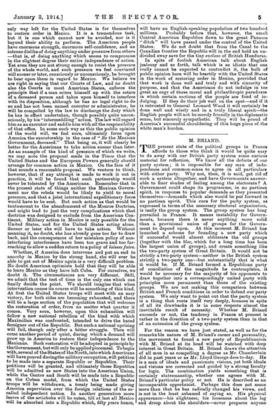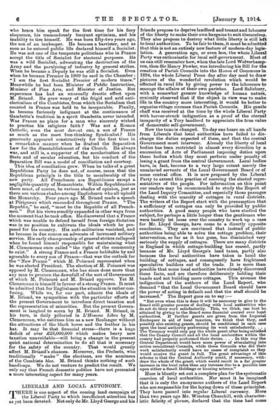M. BRIAND.
T"present state of the political groups in France affords to those who think it would be quite easy to do away with our British party system some curious material for reflection. We know all the defects of our party system ; it is impossible for any man of inde- pendence and common-sense to agree in all particulars with either party. Why not, then, it is said, get rid of such a system altogether, and have Governments answer- able to finer shades of feeling among the electorate ? A Government could shape its programme, in no partisan spirit, in response to popular demands as they presented themselves—demands which also would be put forward in no partisan spirit. This cure for the party system, as expressed in terms of the necessary electoral organization, is really the group system. The group system has long prevailed in France. It means instability for Govern- ments, because there is never anything more solid than a provisional union of groups for the Govern- ment to depend upon. At this moment M. Briand has launched a scheme for founding a new party which if successful would almost obliterate the old groups (together with the bloc, which for a long time has been the largest union of groups), and create something like the two-party system of Great Britain. It would not be strictly a two-party system—neither is the British system strictly a two-party one—but substantially that is what it would be. If M. Briand formed a Republican party of conciliation of the magnitude he contemplates, it would be necessary for the majority of his opponents to draw together into a correspondingly united party with principles more permanent than those of the existing groups. We are not making this comparison between British and French conditions in order to defend our party system. We only want to point out that the party system is a thing that roots itself very deeply, because in spite of all its drawbacks it is in some respects almost the inevitable result of necessity. Whether M. Briand succeeds or not, the tendency in France at present is rather in the direction of a two-party system than in that of an extension of the group system.
For the reason we have just stated, as well as for the remarka tile nature of M. Briand's career and personality, the movement to found a new party of Republicanism with M. Briand at its head will be watched with deep interest in Great Britain. M. Briand draws the attention of all men in as compelling a degree as Mr. Chamberlain did in past years or as Mr. Lloyd George does to-day. Ile is a man of ideals and passionate visions, yet both ideals and visions are corrected and guided by a strong faculty for logic. The combination yields something that is certainly statesmanship, whether one agrees with M. Briand's particular policy or not. He is described as an incomparable opportunist. Perhaps this does not mean more than that he has radically changed his views, and is not in the least ashamed of saying so. His physical appearance—his slightness, his looseness about the leg and droop about the shoulders—never prepares anyone who hears him speak for the first time for his fiery eloquence, his tremendously buoyant optimism, and his inability to tire himself. He was born fifty-two years ago, the son of an innkeeper. He became a barrister, and as soon as he entered public life declared himself a Socialist. Be was not one of the temperate politicians who in France accept the title of Socialiat for electoral purposes. He was a wild Socialist, advocating the destruction of the Army and the paralysing of industry by general strikes. When he became a Deputy he was still a Socialist. Even when he became Premier m 1909 he said in the Chamber: " I am the first Socialist Premier of modern times." Meanwhile be had been Minister of Public Instruction, Minister of Fine Arts, and Minister of Justice. But experience has had an unusually drastic effect upon M. Briand. Be grew weary of the frigid and arid anti- clericalism of the Combistes, from which the Socialism that counted in France was held to be inseparable. Finally, he became furiously indignant at the continuance of Gambetta's tradition in a spirit Gambetta never intended. Was France no place for a man who sincerely wished to practise his religious faith ? Was not a Roman Catholic, even the most devout one, a son of France as much as the most free-thinking Syndicalist? His generosity appeared constructively for the first time in a remarkabie manner when he drafted the Separation Law for the disestablishment of the Church. He always was, and still is, a supporter of the secularization of the State and of secular education, but his conduct of the Separation Bill was a model of conciliation and courtesy. This idea of conciliation grew. When he talks of a great Republican Party he does not, of course, mean that the Republican principle is the title to membership of the new party. All Frenchmen are Republicans except a negligible quantity of Monarchists. Within Republicanism there must, of course, be various shades of opinion, just as there are various shades among Englishmen who all uphold the Monarchy. Four years ago M. Briand made a speech at Perigueux which resounded throughout France. "The Republic," he said, "must be the Republic of all French- men." But his views steadily expanded in other ways from the moment that he took office. Be discovered that a France which was unable to defend herself from foreign dictation was in no position to cultivate the ideals which he pro- posed for his country. His anti-militarism vanished, and he became in due course an advocate of increased military service. His early championship of general strikes collapsed when he found himself responsible for maintaining what M. Clemenceau once called "the right of the community to exist." A strong France and a France habitable by and agreeable to every son of France—that was the outlook for the "New Fiance" which M. Poineme represented when he was elected President. The election of IL Poincare was opposed by M. Clemenceau, who has since done more than any man to procure the downfall of the sort of Government of which M. Poincare and IL Briand approve. Yet H. Clemenceau is himself in favour of a strong France. It must be admitted that for Englishmen the situation is rather con- fusing. While we, for our part, admire the ideals of M. Briand, we sympathise with the particular efforts of the present Government to introduce direct taxation and the representation of minorities. But the present Govern- ment is laughed to scorn by M. Briand. M. Briand, in his turn, is daily pilloried in L'H(nntne Libre by H. Clemenceau, who satirizes him as a new Boulanger without the attractions of the black horse and the feather in his hat. It may be that financial stress—there is a huge deficit of over .Z28,000,000 which makes heavy new taxation unavoidable—will bring a change in the present quiet national determination to do all that is necessary for the safety of the country. That would greatly affect M. Briand's chances. Moreover, the Prefects, who traditionally " make " the elections, are the nominees of the Combiste bloc. H. Brand thinks nothing of such handicaps. We do not venture to predict the result. We only say that French domestic politics have not presented a more interesting aspect for many years.



















































 Previous page
Previous page